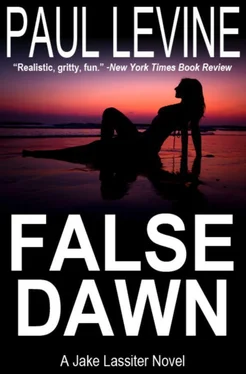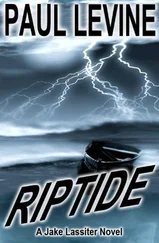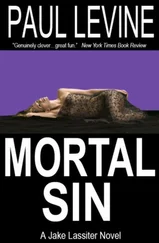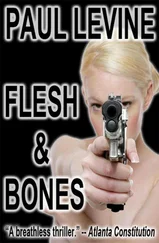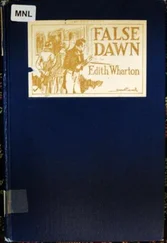Paul Levine - False Dawn
Здесь есть возможность читать онлайн «Paul Levine - False Dawn» весь текст электронной книги совершенно бесплатно (целиком полную версию без сокращений). В некоторых случаях можно слушать аудио, скачать через торрент в формате fb2 и присутствует краткое содержание. Жанр: Криминальный детектив, на английском языке. Описание произведения, (предисловие) а так же отзывы посетителей доступны на портале библиотеки ЛибКат.
- Название:False Dawn
- Автор:
- Жанр:
- Год:неизвестен
- ISBN:нет данных
- Рейтинг книги:3 / 5. Голосов: 1
-
Избранное:Добавить в избранное
- Отзывы:
-
Ваша оценка:
- 60
- 1
- 2
- 3
- 4
- 5
False Dawn: краткое содержание, описание и аннотация
Предлагаем к чтению аннотацию, описание, краткое содержание или предисловие (зависит от того, что написал сам автор книги «False Dawn»). Если вы не нашли необходимую информацию о книге — напишите в комментариях, мы постараемся отыскать её.
False Dawn — читать онлайн бесплатно полную книгу (весь текст) целиком
Ниже представлен текст книги, разбитый по страницам. Система сохранения места последней прочитанной страницы, позволяет с удобством читать онлайн бесплатно книгу «False Dawn», без необходимости каждый раз заново искать на чём Вы остановились. Поставьте закладку, и сможете в любой момент перейти на страницу, на которой закончили чтение.
Интервал:
Закладка:
After the second round of drinks, Soto began talking. “I was with Fidel at the University of Havana when he ran for student office. I was with him on July twenty-sixth, 1953, in the attack on the Moncada military barracks. They threw us both in prison.”
I studied Soto’s lined face, his sad eyes. His mind seemed elsewhere. In the mountains maybe, leading the guerrillas. In prison, perhaps.
“Fidel was so idealistic,” he said.
Lourdes patted his hand. “You both were, Papi.” She was wearing a black cotton mini with a matching sweater jacket almost as long as her skirt. Under the cocktail table, she had kicked off her sandals and was stroking my leg with the ball of her foot.
Soto drained his sweet minty drink and declined a third, asking the waiter for a beer. “We took Havana on New Year’s Eve, December thirty-first, 1958, firing our weapons into the air, celebrating the new year and a new Cuba, the coward Batista fleeing with his jewels. He was a pig who sold out the country to the Americans who wanted nothing more than a place for sun, rum, and sex.”
Three of the four essentials of life, I thought, figuring football wasn’t that popular on the crocodile-shaped island.
Soto’s eyes were moist. He was staring into the past. I tried to imagine what it was like for the proud revolutionary, arm in arm with his friend Fidel, both brimming with the vigor of youth, the promise of the future. Then something came to me. “New Year’s Eve,” I murmured. “Twelve, thirty-one, fifty-eight. That’s the combination for the lock on your studio.”
Soto looked at me and smiled. “It was the high point of my life, a day to remember para siempre.”
After that it was all downhill, I thought. But where else is there to go after reaching the peak? Maybe now, after all these years, having sacrificed his body to a revolution and then a counterrevolution, this was his way of climbing the mountain again. Bring down the last revolutionary, and let him know it was you from so long ago. To the rest of us, Castro was titanic, one of the century’s legendary figures. A monster to some, a visionary to others, either way his impact would be stamped in the history books forever. But to Severo Soto, he was something else. Soto knew Fidel before the whiskers and the fatigues. Two sharp-witted youths quick of gait and strong of limb. Their future was forever, their potential infinite. But Fidel was a boyhood confederate turned archenemy. With Soto, I thought uncomfortably, it wasn’t political, it was personal.
After one more drink, we settled into our rooms. My window looked out over Old Havana, and I watched as ancient buses, crammed with workers, belched black smoke into the early evening air. Gas rationing had emptied the streets of cars, but thousands of bicycles streamed each way on the boulevard in front of the hotel. The room was spacious and neat, and the plumbing worked, though not without whining about it. Later, I joined Severo Soto and his daughter in the dining room downstairs.
Over a dinner of calabaza soup and paella with giant shrimp, Soto kept talking, and Lourdes resumed stroking my leg. The latter impaired my ability to fully appreciate the former.
“Your State Department, what geniuses they think they are. Estupido! They thought Fidel could be forced to change, so they gave orders. Do this, do that. Don’t fraternize with the Russians. Like a man who stupidly mistrusts his wife, the U.S. drove Cuba to another man.”
Later, after sweet rice pudding served in half a coconut shell, we had cafe Cubano. Soto was still talking. “And what has the embargo accomplished? Has it brought Fidel crying to Washington? No, it has made him more resolute, even as the country has sunk into poverty. The Cuban people watch the Americans sell wheat to the Russians, even before reforms, and give Favored Nation status to the Chinese who crush students with tanks. So why does Los Estados Unidos refuse to sell pickup trucks to a country ninety miles away, or buy its sugar? Does this make sense?”
“Papi, do you think Jake is interested in all of that?”
He seemed to consider the question. “No. Like most Americans, he surely is not interested in the arrogance of his own government. For over thirty years, the American leaders lectured Cuba: Don’t you dare follow the Soviets. Now, all of a sudden, they point to Moscow and say: Now, follow their example. Liberalize. Hold elections. Embrace capitalism. Do as the Russians do. Don’t you find that curious?”
“I don’t get it,” I said. “You’re against American interference. You’re against Castro. You were against Batista, so what are you for? What’s the answer to Cuba’s problems? What is its future?”
He drained the last of his cafe Cubano. “When we succeed here, Senor Lassiter, you will know the answer to those questions.”
Soto stood and bid us both good night. He pecked Lourdes on the cheek and slapped my shoulder, then headed for the elevator.
“What did your father mean by that?”
She shrugged, then took my right hand in both of hers. The look in her eyes said that political talk was out.
“Lourdes, tell me. What’s your father’s agenda?”
“Whatever the CIA tells him to do.”
“I don’t buy that. I doubt your father’s ever done what he’s been told.”
She smiled and tickled my palm with a red, sculpted fingernail. “Don’t listen to an old man prattle on about how he would have changed the world. Maybe he would have, but he spent the better part of his life locked up in Combinado del Este. I love my father and wouldn’t say this to his face, but now he’s an errand boy for Washington. He’s to accompany you as a representative of U.S. interests in any negotiations with Foley. But he has no authority. He will merely transmit messages back and forth between here and his superiors.”
With that, she leaned closer, put her hand behind my head, and pulled me to her. Her lips touched mine. I tasted the sweetness of the sugary dessert mixed with her warm breath.
“My room has a view of the Capitolo,” I said.
I was stretched out on my back on the lumpy bed, watching the breeze swirl the lacy curtains into the room. Lourdes was sleeping, her head on my chest, purring contentedly, when the phone rang. It had a jarring, metallic twang that startled me. Lourdes stirred as I reached for the receiver.
“Hello, Lassiter,” Robert Foley said. “ Bienvenidos a Cuba. ”
24
How much money does one man need?” Robert Foley asked.
“A million dollars, ten million, a hundred million?” He gestured to the waiter who silently refilled his champagne glass. “How much lobster can one man eat?”
Apparently, quite a bit. Foley was squeezing lime juice onto the tail section of his second grilled Caribbean lobster. Above us, the palm trees swayed gently in the nighttime breeze.
“How many women can one man screw?” he asked, between bites.
Now there was a purely theoretical question as far as I was concerned.
Foley turned to the young woman-maybe twenty, maybe not-whose chair was pushed up against his. Cocoa skin, shoulder-length black hair, she sipped at a daiquiri, keeping one hand draped on Foley’s shoulder, occasionally showing him an adoring smile. Either our conversation bored her, or she didn’t understand English. He hadn’t bothered to introduce us and scarcely seemed to notice her.
“This is the issue in my life, Lassiter. How do I want to spend the next twenty years?”
“How about breaking rocks at Leavenworth?” I suggested, helpfully.
He kept going as if I weren’t there. “I’ve been anonymous my entire life, and I like it that way. Army intelligence, then the Company. Do I really want my picture on the cover of Newsweek, the guy who pulled off the biggest heist in history?”
Читать дальшеИнтервал:
Закладка:
Похожие книги на «False Dawn»
Представляем Вашему вниманию похожие книги на «False Dawn» списком для выбора. Мы отобрали схожую по названию и смыслу литературу в надежде предоставить читателям больше вариантов отыскать новые, интересные, ещё непрочитанные произведения.
Обсуждение, отзывы о книге «False Dawn» и просто собственные мнения читателей. Оставьте ваши комментарии, напишите, что Вы думаете о произведении, его смысле или главных героях. Укажите что конкретно понравилось, а что нет, и почему Вы так считаете.
